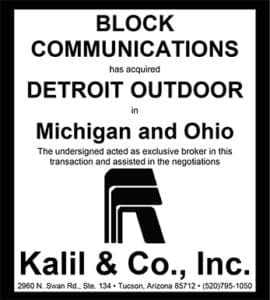
By Ken Klein, Executive Vice President, Outdoor Advertising Association of America
Sex offenders, panhandlers, and rock musicians won in court on the First Amendment. Localities trying to regulate signs based on content have lost.
Today’s Supreme Court – led by conservatives — is pro-free speech.
What does this mean for billboards?
- Billboard operators retain the right to deny copy.
The First Amendment does not compel billboard speech. The industry’s Code of Principles respects the option to reject messages.
Billboard managers — acting as editors and publishers — commonly suggest changes in content, tone, location, and more. On occasion, a billboard company accepts copy rejected by another company.
- Billboard laws are under First Amendment review.
A state court in Texas and a federal court in Tennessee have invalidated billboard regulations in those states on constitutional grounds. Both cases are on appeal.
Elsewhere, courts say that sign rules properly balance regulation and free speech.
Current challenges to billboard controls could take years to resolve, and may reach the Supreme Court, say legal scholars.
In Texas on June 15, the governor signed a new law that regulates billboards if money changes hands (i.e. commercial transactions). Proponents of the new law say it is not based on sign content.
- The First Amendment is the basis for challenging Baltimore’s billboard tax.
In 2013, Baltimore enacted a tax on billboards ($5 per square foot, $15 per square foot for digital billboards).
The city describes the measure as a lawful excise tax on the privilege of doing business in Baltimore. On June 7-8, a Maryland Tax Court heard Clear Channel’s constitutional challenge. The company argued that targeted taxation singling out one medium of speech could have a chilling effect on speech, and therefore is unconstitutional. A ruling is expected later this year.
A series of First Amendment cases have protected free speech.

On June 19, a unanimous Supreme Court said the federal government violated the First Amendment by denying trademarks it considers disparaging (Matal v. Tam).
An Asian-American rock band called the Slants, led by Simon Tam, tried to register the group’s name in 2011. The US Patent and Trademark Office turned down the request, citing the 1946 Lanham Act which prohibits registration of disparaging trademarks.
A side note: this ruling will help the Washington Redskins keep its name.
The Supreme Court – also on June 19 – struck down a North Carolina law meant to keep registered sex offenders off websites and social networks (Packingham v. North Carolina).
In 2015, a unanimous Supreme Court struck down a local sign ordinance that treated temporary church signs differently than other temporary signs (Reed v. Town of Gilbert).
Reed was cited in challenges to billboard controls in Texas and Tennessee, as well as successful efforts to invalidate restrictions on panhandling and other forms of expression.
[wpforms id=”9787″]
Paid Advertisement

















